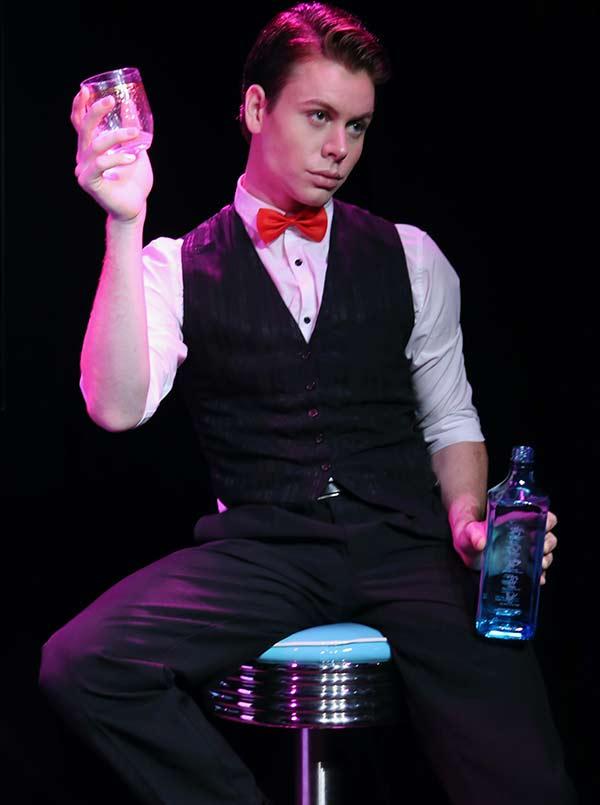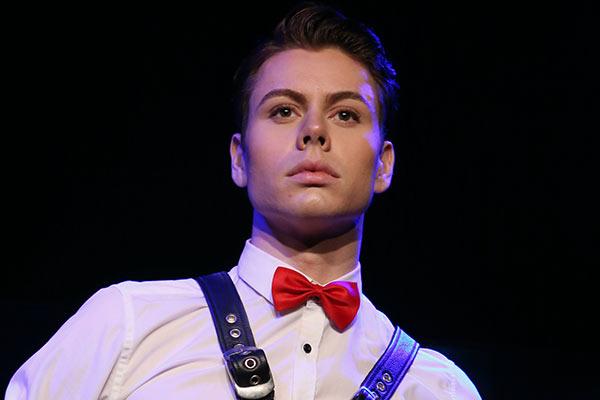It was first introduced to audiences as part of Sydney WorldPride, and now Paul Bugden's queer coming-of-age story 'Stardust', directed by Nicholas Flanagan, is set to play for Sydney Fringe audiences.
'Stardust' is a 60-minute monologue, inviting attendees into the heart of the 1970s New York gay scene. Tommy, a young Australian performer, is living in Manhattan and has his sights firmly set on the bright lights of Broadway.
In a post-Stonewall, pre-AIDS NYC, the city is intoxicated with liberation and explosive sexual energy – and Tommy might just lose his way. He's drawn into the dark side of the sexual revolution, and reveals traumas he's fled to the other side of the world to try and escape.
Tommy takes a sideways move into erotic dancing, gay burlesque and more. . . When an unexpected visitor arrives and breaks the spell.
'Stardust' also offers insight into life in a homophobic Australia prior to Campaign Against Moral Persecution.
Here, we chat to 'Stardust' Writer Paul Bugden and performer Robbie Alexander about the show.
Paul, what inspired you to write ’Stardust’?
'Stardust' is my attempt to articulate what it was like to grow up in homophobic Australia of the '60s. And then, to collide, head on, with the convulsive changes taking place in America in the 1970s, specifically in New York City. When I just happened to land right in the thick of it. Civil rights, women’s lib, gay lib – and the brakes were off.
And Robbie, what’s it like to bring Paul’s words to life on stage?
As a performer, it’s very hard to find a point of connection between everything you read and audition for. However, from the second I received the script for 'Stardust', I was completely immersed in the story and hadn’t related so much to a piece of writing before. It is both the most rewarding and most exhausting show I’ve ever been a part of. Every time I get to rehearse and perform this masterpiece is an absolute gift, I could not be more grateful.
Paul, why do you think a story like this is important for people to see?
The social changes in the west, particularly in Australia and the USA, have been profound. 'Stardust' takes place at the start of this revolution. Who would ever have believed marriage equality would be on the cards? Hopefully the play demonstrates how far we’ve come. And it can also serve as a warning as to how easily things can revert. Even the current Special Inquiry into LGBTIQ+ hate crimes in NSW is reflected in the play. But there are also plenty of laughs.

For each of you, where did your love for the arts/theatre come from?
Robbie: My love for acting and theatre started in my high school drama classes. Being surrounded by other creative, like-minded people felt amazing. Coming from a dance background, I didn’t think that movement and theatre had mutuality. Obviously, to my surprise, they are two peas in a pod. I immediately fell in love.
Paul: I grew up in a country pub. My parents were always working. I had to learn to amuse myself. I produced puppet shows and plays from a young age for the house guests. I adored cinema and spent Friday nights and Saturday afternoons at the Star Court theatre. Dad acquired an 8mm home movie camera and I started making little films. The artistic drive was there from the start.
Paul, this premiered to sold-out audiences in February. What was that initial reception like?
I was surprised and deeply gratified by the audience response. They went with the story completely and it appealed to very mixed audiences. Of course a great deal of the play’s success is to do with Robbie’s outstanding performance. I could not wish for a better, more talented young actor to realise my play. It’s a tough ask but Robbie is truly extraordinary. He’s taken complete ownership of the play.
Robbie, what are you most looking forward to about presenting the show to Fringe audiences?
In February the show touched so many people’s hearts. Hopefully more people will get the opportunity to hear Paul’s heartfelt writing. I am also excited to perform in a bigger space and to play with the dynamics of the show. I can’t wait for people to see what we’ve created.
It’s essentially a ’60-minute monologue’. Robbie, what’s been the biggest challenge performing it?
Remembering to hit all of the beats and the blocking for one hour straight is a massive challenge. Though, staying hydrated is the hardest part because I never leave the stage. Haha. My character goes through a very intense emotional journey so I need to make sure that I don’t get burnt out, not only by the end of the show but by the end of the run.

Paul, why do you think this show belongs within Sydney Fringe?
Fringe offers writers like me the opportunity to showcase new work to enthusiastic audiences at affordable prices. Audiences understand and accept the limitations of a Fringe show. Also, the Fringe network is worldwide. If a work is successful, the opportunities are limitless.
To each of you – what has been the biggest reward being a part of ’Stardust’?
Paul: The biggest reward has been working with Robbie Alexander, our director/dramaturg Nicholas Flanagan and our designer Skye Williams. Their faith in the play has been extraordinary.
Robbie: To tell such an important story feels like the utmost privilege. I feel so lucky to be trusted with this role, and to be on this journey with Paul and our director Nicholas to see where this show can go. I get to live vicariously through my character Tommy during the most exciting, liberating and terrifying times of queerness. What more could you want?
'Stardust' plays Flight Path Theatre (Sydney Fringe) 19-23 September.

